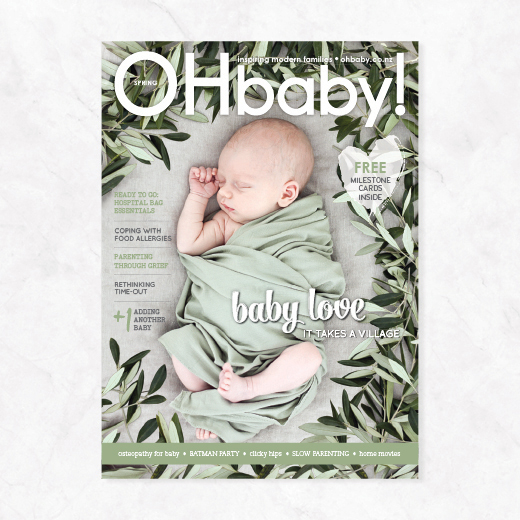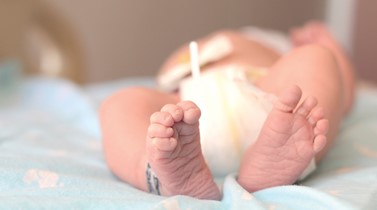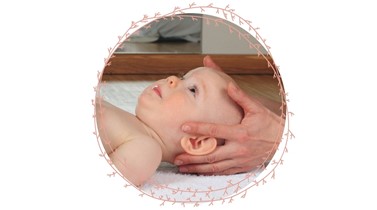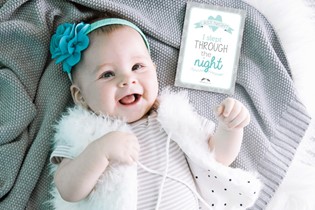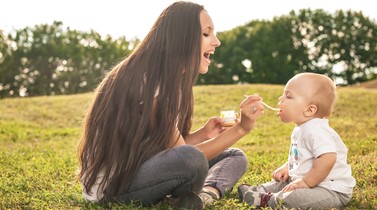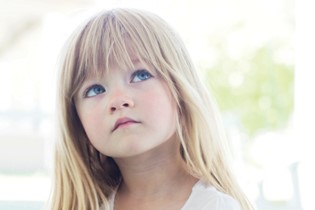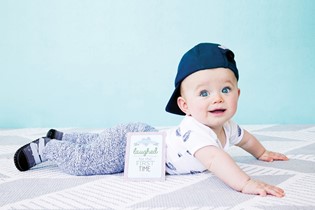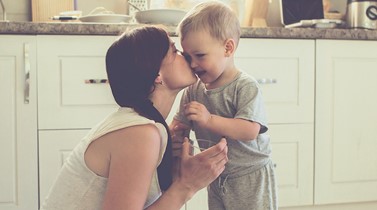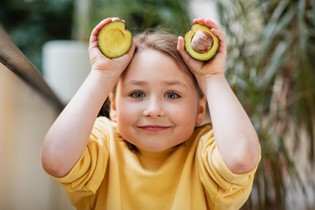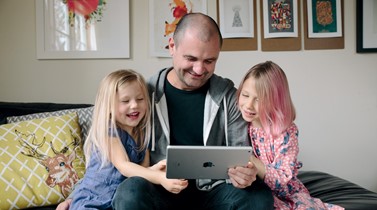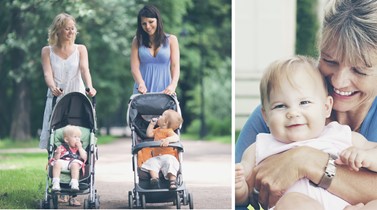Hello and goodbye: farewelling a parent while raising a young family

Welcoming a child to the world is life-changing. So is farewelling a parent. When these events happen in close succession, the world can seem upside down. Megan Hawkins shares her family’s moving story.
Losing a parent is something the majority of us will go through at some time in our lives. Second only to losing a child or a partner, it is a heart-breaking season that begins with raw grief and moves into facing the world without the person that has been a constant in your life up until now.
There is never a good time to lose a parent, but to lose your mum or dad as a new parent yourself has a particular sting in the tail. In what is typically a joyous family time, with doting grandparents lavishing love and affection and watching their grandchildren grow, you are instead faced with figuring out how to be a parent without someone who had so much more to teach you about the parenting role.
Parenting through caring for a dying parent and parenting through the subsequent grief has its own series of challenges. A large part of your ‘normal’ life goes on hold, but being a parent does not. In a way, you (and your partner) are having to ‘parent’ even more than normal because suddenly you are thrown into a minefield of parenting dilemmas you probably hadn’t discussed or even considered yet. How much do you tell your kids? How do you feel about your children visiting the hospital? Is it a step too far for your children to see their grandparent’s deceased body?
As parents we want to shield our children from pain – physical and emotional. But should we face losing a parent while our children are young, it is something we can’t hide from them. Not only will they see and feel our pain, they are also losing a beloved grandparent and it’s up to us to work out how to walk alongside and help our children through.
Good grief
Michelle Parkinson, a family and grief counsellor, highlights the importance of being as real as you can with children about what’s happening, while also being mindful of using language that a child is developmentally able to understand. “A parent will have a good understanding of what their child will be able to grasp. Children also need ideas to be repeated again and again so that they can grapple with the new information. Explanations around dying and death will vary from family to family, due to the cultural and religious beliefs held in the family – the important thing is the willingness to have discussions with the child, not necessarily that you have the answers about sickness and death” explains Michelle.
Books can help to start difficult conversations and guide explanations of death and dying. I had a great book recommended to me, Old Hu-Hu by New Zealand author Kyle Mewburn. It deals with the topic of life and death in an emotional, yet sensitive way, with Little Hu-Hu reaching the conclusion that Old Hu-Hu lives on in him and he can treasure the memories they made together.
Our son Nate was only 15 months old at the time of my Dad’s terminal lung cancer diagnosis. My husband and I decided that (given Nate’s age) we were comfortable exposing him to each element of what was to come, including talking with him about where we were and why we were there. We felt we should level with him, not hide our emotions, but we continued to have fun when the opportunities presented themselves.
Challenge on challenge
That’s not to say it was easy! In the seven weeks between Dad’s diagnosis and his passing, I travelled from Auckland to Hamilton twice a week; mid-week to help Dad get his affairs in order, and at the weekend as a family.
Luckily both my husband and I had incredibly supportive employers who let us juggle our time between home and work, and Auckland and Hamilton, without adding extra pressure on us. But it still meant significant upheaval in Nate’s world. It meant more time for him in the care of a very dear friend and both his grandmothers, and it meant I had to really concentrate on being present for him in the time we did have together because some weeks it was few and far between. I was of course concerned about the impact all the sudden change and being confronted with sadness and hospitals would have on my son.
What I realised though is that the resilience of children is so easy to underestimate. When Dad first went into hospital, Nate just took everything in his stride. He was too young to understand the gravity of the situation, or comprehend what was yet to come, but for a lively young boy he very rarely cried or got up to mischief whenever we visited Dad (although the hand sanitiser pump hanging on the end of the bed proved too tempting to resist). Even through Dad’s appearance drastically changing from week to week, he would still run into his room, bounce up to the bed and say "Hi Gamps, lalu (love you)".
My biggest (and ongoing) sadness around Dad’s passing was that he was alone at the time. It was a Sunday morning and we were getting ready to drive to Hamilton when we got the call from Hospice. We made the decision to not let Nate see Dad’s body at Hospice, mostly because I didn’t know how I was going to react and I didn’t feel like I could give in to that initial grief with Nate present. We did, however, take Nate to visit the funeral home once they had dressed Dad. We told Nate it was time to say goodbye to Gramp’s body and to tell him we love him and that we would miss him. Again he took it all in his stride. He waved goodbye and said “Lalu Gamps”. I, of course, cried. And, bless him, Nate wiped away my tears.
Michelle says she would recommend ‘normalising’ the death to help children through the early days. “Saying things like 'Mummy’s just crying because she’s missing Poppa again' gives the child a wonderful acceptance of grief as normal and okay, and makes the experience of feelings not overwhelming. You can give your child a sense of security in seeing that you’re sad (maybe very, very sad), but life is continuing and you’re not overwhelmed, and there is and will be happiness again. You can bring the loved one into everyday conversation, even with a pre-verbal baby, by talking about them, recounting memories of them and looking at photos.”
I found that showing Nate old photos when we were putting together the slideshow for Dad’s funeral was quite a special moment, especially finding photos of Dad at a young age and spotting the cheeky grins that are so similar to what I see on a daily basis.
Ashes to ashes
Michelle’s advice for including children in the funeral planning and on the day is to give them the opportunity to be involved, but without any pressure. “Keep discussions open, offering them open- ended opportunities like 'Would you like to do something at Nana’s funeral?' without any pressure or expectation.” Michelle says to prepare children as much as possible for what they can expect from a funeral and to take the shock factor out – give them an indication of what the funeral might look like, and the different ways in which people might act. Ask them how they think children will be expected to behave, and what they think are the different ways people express sadness.
We chose for Nate to be at Dad’s funeral, and I’m so thankful we did. He injected a whole lot of lightness and laughter with his antics – what toddler wouldn’t stand on the ‘stage’ and grin when you have a captive audience of 200! It meant a lot to me to hear from people afterwards about how much they enjoyed meeting Nate as Dad used to speak of him often, always with photos at the ready.
The new normal
Possibly the hardest part of the whole journey is after the funeral, when everyone goes back to their ‘normal’ lives leaving you to adjust to your new family reality. I didn’t find it a massive upheaval in my day-to-day life as, with Dad living in Hamilton, it wasn’t unusual for us to go a month or two without seeing each other. The grief was still very present, however, and it would often surprise me when it would surface. I remember watching a movie around six months later about a father and son and absolutely breaking down. There weren’t any remarkable resemblances to Dad or his (or our) story. I still can’t really pinpoint exactly what triggered the grief for me. One of the best descriptions I have come across for grief is comparing it to ocean waves. In the beginning the waves are high, choppy and relentless. So rough you feel like you might drown. Then, as time passes, they slow to a gentle roll, with the odd unexpected dumper that catches you off guard. Eventually you reach a point where you can lie back in the calm ocean and enjoy the sun on your face again, and you can anticipate those waves coming – birthdays, anniversaries, special events.
In terms of looking forward, Michelle suggests a family discussion about what you as a unit would like to do to remember and celebrate your loved one. You could plant a tree, frame a picture or visit a significant place together every year. We have chosen to have photos around the house of Dad, and we visit the cemetery with my brother on Dad’s birthday and the anniversary of his death every year. We talk to Dad, clean up his plaque and garden, and tell him we love him and miss him.
The two-year anniversary of my Dad’s passing is coming up and with it comes a lot of reflection on the time since he has been gone. Thinking back on those early days, I’m grateful that I had to go through losing my Dad after having a child, because before children I think you are naturally a more self-absorbed version of yourself. Your body and your time are your own. Through it all I couldn’t hide under a duvet because there was a little life that depended on me. I was a 30-year-old woman, a daughter going through losing a parent; but I was still a mother, a wife, a sister, a friend, a colleague. Everyone around me (most especially my husband, but also my Mum, my brother, my colleagues and my dear friend who looked after Nate for me when I needed to be in Hamilton during the week) were incredibly supportive and understanding, but if there was one thing I couldn’t drop the ball on, it was remaining the centre of Nate’s world. I can genuinely, hand on heart say I don’t know how I would have got through it all without those beautiful blue eyes to focus on. He brought simple and genuine love and laughter into every room, in every situation. Those moments he and Dad had together – that had Dad not been sick, they would not have had – are now treasured memories. This obviously doesn’t take away from the sadness that Dad won’t get to see Nate and any future grandchildren grow up and reach their childhood milestones, but it does mean I can look back on that time with immense fondness and a warm heart. And it means I can look forward knowing that I did everything I could for my Dad at his time of greatest need, and that whatever happens next, he will be included in one way or another.

From left: Megan and her dad on her wedding day; Gramps and Nate, aged five months old.
MICHELLE PARKINSON OFFERS THREE TIPS FOR PARENTING THROUGH GRIEF
Each child is different
There aren't age-appropriate guidelines around death and funerals – it depends on the child and family. Careful discussion around what to expect can remove some of the element of shock for the child. Children will take cues from a parent on how to respond to such events – a child can witness a positive and loving expression of grief and not be traumatised.
Take care of you
So important! Ideas to take care of yourself might be a bath, a hair cut, coffee with a friend, time without children to journal/walk/exercise, saying 'no' to extra stuff and making sure you get to bed early – whatever YOU need. Part of that self-care is giving yourself time to grieve and process the changes that have happened.
More of Michelle’s advice on parenting through grief can be found here.
Megan Hawkins is mum. She has re-discovered her passion for writing and is loving the opportunities freelance writing in her 'spare' time is providing.

AS FEATURED IN ISSUE 35 OF OHbaby! MAGAZINE. CHECK OUT OTHER ARTICLES IN THIS ISSUE BELOW
